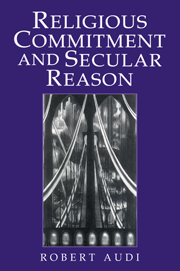Book contents
- Frontmatter
- Contents
- Preface
- PART ONE THE FOUNDATIONS OF DEMOCRACY AND THE SEPARATION OF CHURCH AND STATE
- PART TWO THE ETHICS OF CITIZENSHIP AND THE BALANCE OF RELIGIOUS AND POLITICAL ARGUMENTS
- PART THREE CIVIC VIRTUE AND POLITICAL ACTIVISM IN A RELIGIOUSLY PLURALISTIC DEMOCRACY
- 6 Civic Virtue
- 7 Religious Conviction and Political Activism
- Conclusion: Ethics, Religion, and Democracy
- Notes
- Index
7 - Religious Conviction and Political Activism
Published online by Cambridge University Press: 05 June 2012
- Frontmatter
- Contents
- Preface
- PART ONE THE FOUNDATIONS OF DEMOCRACY AND THE SEPARATION OF CHURCH AND STATE
- PART TWO THE ETHICS OF CITIZENSHIP AND THE BALANCE OF RELIGIOUS AND POLITICAL ARGUMENTS
- PART THREE CIVIC VIRTUE AND POLITICAL ACTIVISM IN A RELIGIOUSLY PLURALISTIC DEMOCRACY
- 6 Civic Virtue
- 7 Religious Conviction and Political Activism
- Conclusion: Ethics, Religion, and Democracy
- Notes
- Index
Summary
The overall theory developed in this book can be clarified and shown to be fruitful by application to some deeply troubling issues. The abortion question is among the most divisive and will be my main example, but there are many other issues that raise difficulties concerning the proper balance of religious and secular considerations in public policy decisions. I will not propose a stand on the moral or legal status of abortion; but I believe that my overall position on the balance between the religious and the secular provides a basis on which a free society can operate without undue strife despite irreconcilable religious differences among its citizens on abortion and other profound issues. If, as individuals or as occupants of government roles, we are guided by the principles defended in this book, and by appropriate ideals of civic virtue that reflect them, we can at least agree on a framework for accommodating civilized disagreement and on the kinds of reasons needed to justify governmental coercion. The two sets of separation principles I propose, those addressed to individual citizens and those addressed to governmental or other institutions, can strengthen that framework without undermining the respect and autonomy that religious people and institutions should have.
This is not to suggest that the problem of the moral status of abortion can be resolved in the foreseeable future. It is not even clear that we may hope that the problem will soon be less hotly contested.
- Type
- Chapter
- Information
- Religious Commitment and Secular Reason , pp. 181 - 208Publisher: Cambridge University PressPrint publication year: 2000



